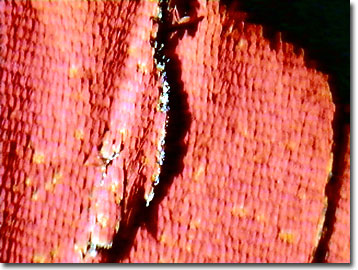Butterfly Wing Scale Digital Image Gallery
Red Panacea Butterfly
Although not the cure-all that its common name indicates, the red panacea butterfly is a wonder to behold. One of the swiftest of the tropical rainforest butterflies, the species often soars at the canopy level. The undersides of its graceful wings are covered in eye-catching reds and pinks while metallic greens and blues shine on their black upper sides.

Red panacea butterflies, scientifically classified as Panacea prola, consist of two recognized subspecies that are both considered quite common. The species exhibits sexual dimorphism through wing pattern and size of the adults. Females are generally larger and have more markings on the undersides of their wings than males, but both sexes possess a front pair of highly modified, brush-like legs that are used for tasting the suitability of plants. Although strong fliers, these tropical butterflies make periodic stops in their flight patterns, often breaking to gather moisture and salts at saline outcrops and to feed at rotting fruits for energy, moisture, and other nutrients.
The Amazon Basin and the mountain forests of Peru, Ecuador, Venezuela, Colombia, and Costa Rica are the native habitats of red panacea butterflies. However, mass flights of this Neotropical lepidopteran, which can lead to additional populations, have been historically documented. In fact, recent research shows that the range of the red panacea has extended into the central region of the Coastal Mountains, a phenomenon quite possibly resultant of migratory behavior. Unfortunately, the new populations are not locally self-sustainable since the species' host plants, Colombian tacay and Orinoco nut trees, are absent. Wide-ranging in vertical distribution, the red panacea butterfly can inhabit areas found from sea level to more than 3,800 meters in elevation.
Butterfly hunters gathering wild specimens for world markets take advantage of the behavioral practices of red panacea butterflies to attract them to baited screen traps. Even though it is not a very rare species, the red panacea butterfly is highly popular with collectors and artists because of its sheer beauty. Specimens are sold commercially, therefore, at relatively high prices. The species is not currently endangered, but the continual destruction of the Neotropical rainforests and development of the Amazon Basin may eventually imperil this currently bounteous butterfly.
Contributing Authors
Cynthia D. Kelly, Shannon H. Neaves, Laurence D. Zuckerman, and Michael W. Davidson - National High Magnetic Field Laboratory, 1800 East Paul Dirac Dr., The Florida State University, Tallahassee, Florida, 32310.
BACK TO THE BUTTERFLY WING SCALE IMAGE GALLERY
BACK TO THE DIGITAL IMAGE GALLERIES
Questions or comments? Send us an email.
© 1995-2025 by Michael W. Davidson and The Florida State University. All Rights Reserved. No images, graphics, software, scripts, or applets may be reproduced or used in any manner without permission from the copyright holders. Use of this website means you agree to all of the Legal Terms and Conditions set forth by the owners.
This website is maintained by our
Graphics & Web Programming Team
in collaboration with Optical Microscopy at the
National High Magnetic Field Laboratory.
Last Modification Friday, Nov 13, 2015 at 01:19 PM
Access Count Since January 21, 2003: 9882
Visit the website of our partner in introductory microscopy education:
|
|
